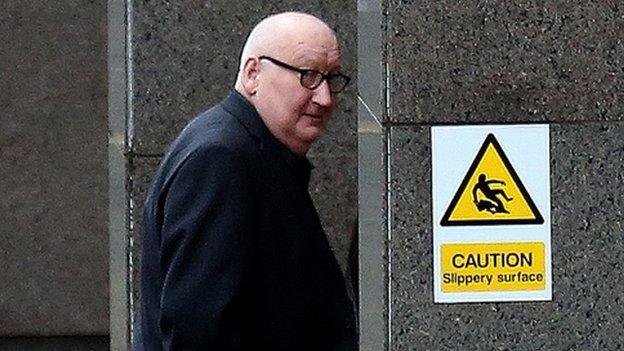Glasgow bin lorry crash: Family hits back at Lord Advocate
- Published
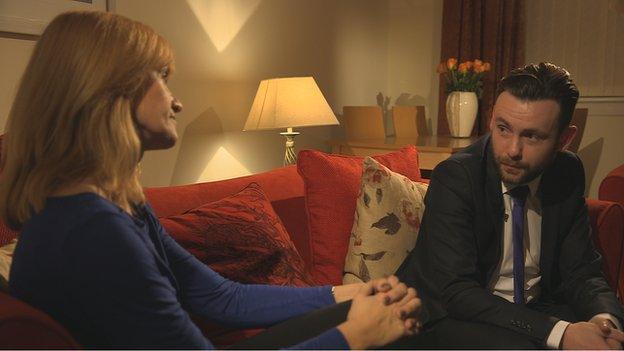
Jackie Morton's son, Adam Russell, described the Lord Advocate's comments as "imprudent"
A man who spoke to the BBC about losing his mother in the Glasgow bin lorry crash has hit out at Scotland's top law officer for criticising the programme.
In the documentary, some relatives of the six victims said a Crown Office official had given them inaccurate information about the driver.
Lord Advocate Frank Mulholland later criticised the BBC for broadcasting "inaccuracies and innuendo".
Adam Russell said he was "stunned" by Mr Mulholland's "imprudent" comments.
The crash killed Mr Russell's 51-year-old mother, Jacqueline Morton, who was from Glasgow.
She died along with Erin McQuade and Jack and Lorraine Sweeney, from Dumbarton, West Dunbartonshire, Stephenie Tait, 29, from Glasgow, and Gillian Ewing, 52, from Edinburgh.
Another 15 people were injured when the lorry veered out of control on 22 December 2014, after the driver, Harry Clarke, blacked out behind the wheel.
'Poorly treated'
In a statement, Mr Russell said: "My family have been poorly treated by the Crown Office and Procurator Fiscal Service from beginning to end and their continued defence of an indefensible position only undermines public confidence in them."
The Crown Office responded by saying it had been concerned by the factual inaccuracies in the documentary and the lack of balance it provided.
It also said it denied the comments which had been attributed to an official.
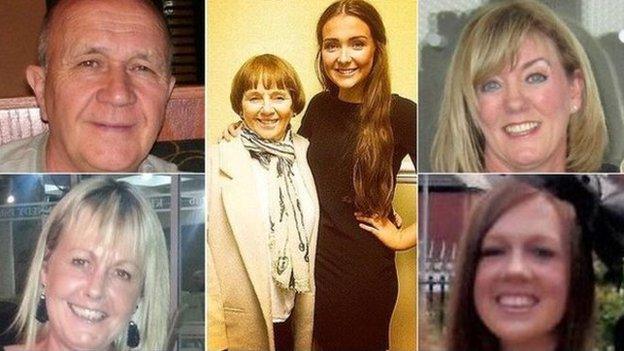
(Clockwise from top left) Jack Sweeney, Lorraine Sweeney, Erin McQuade, Jacqueline Morton, Stephenie Tait and Gillian Ewing were killed in the crash
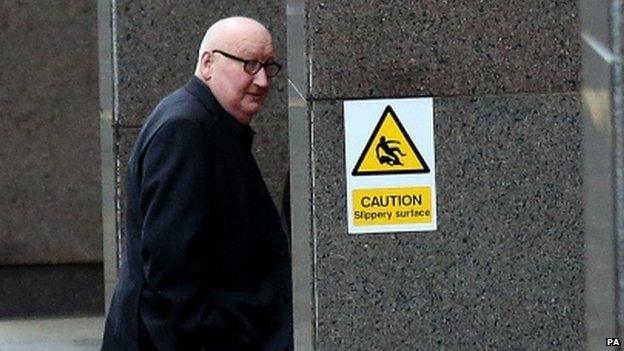
Harry Clarke was unconscious at the wheel when the bin lorry went out of control, killing six people
A fatal accident inquiry (FAI) into the crash, which is due to report back early next year, heard that Mr Clarke had previously fainted at the wheel of a bus, in April 2010.
The BBC documentary, Lies, Laws and the Bin Lorry Tragedy, broadcast on 3 November heard from Mr Russell and Robyn and Lucy Ewing, the daughters of Gillian Ewing.
Mr Russell said that he attended a meeting with Crown Official David Green, just over two weeks after the Crown decided not to prosecute Harry Clarke.
'Different version'
He told the documentary: "David Green proceeded to tell us that Mr Clarke had had a one-off episode which occurred in April 2010 whereby he'd fainted in a canteen, in a hot environment, and this was a one-off event."
Mr Russell said that some weeks later, his lawyers were sent productions from the Crown and he learned a different version of the blackout - that Harry Clarke had fainted at the wheel of a bus.
Lucy Ewing, who was with her mother when she was hit by the bin lorry, also recalled: "We were specifically told he passed out in a canteen. No mention of on a bus."
This is viewed as significant by the relatives as Mr Clarke's 2010 faint was not reported to the Driver and Vehicle Licensing Agency (DVLA).
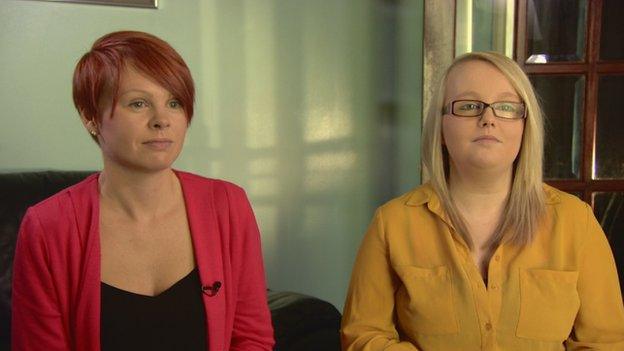
Robyn and Lucy Ewing also spoke to the BBC documentary team
If, however, a driver blacked out while sitting, and if they lost consciousness at the wheel, then they would have to notify the DVLA, and could have their licence restricted.
During the documentary, the two families questioned whether the Crown Office was aware of all the evidence when they made the decision not to prosecute Mr Clarke.
They also accused the Crown Office of misleading them.
The Crown Office told the BBC documentary that it was aware that Mr Clarke had fainted on a bus when it decided not to prosecute and that all evidence was disclosed to families before the FAI.
'Inaccuracies and innuendo'
It has since emerged, however, that Lord Advocate Frank Mullholland was highly critical of the BBC programme and defended his own staff in an internal memo that was later published in The Herald newspaper, external.
In the memo, Mr Mullholland criticised the BBC for broadcasting "inaccuracies and innuendo" over the Crown Office's handling of the crash.
He also described the programme as a "sensationalist documentary".
Responding to the Lord Advocate's comments, Mr Russell said: "Having read the leaked memo on Twitter last week regarding Mr Mulholland's and Catherine Dyer's response to a BBC documentary which I was a part of, I once again feel the need to speak out.
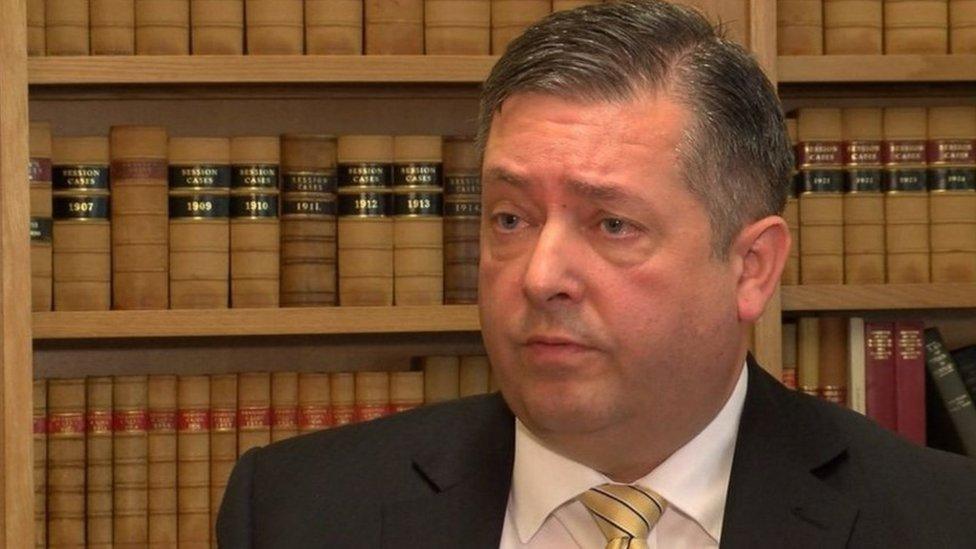
Lord Advocate Frank Mulholland has been strongly critical of the BBC documentary
"I am frustrated that I have to do this as I feel the imprudent comments of Mr Mulholland are a distraction from the impending determination of the fatal accident inquiry."
Mr Russell added: "Given Mr Mulholland was aware that David Green did not give us the same version of events that Mr Mulholland claims to have been aware of, I was stunned to see the uncritical support of David Green."
BBC Scotland said that it stood by "the integrity and accuracy of its journalism" in the documentary and rejected "the general, but non-specific, criticisms reported to be in the Crown Office internal note".
Interview offer
The statement added: "Their internal note reportedly claimed that BBC Scotland wrongly said that the Crown was unaware that the driver had had an episode of impaired consciousness at the wheel of a bus when it decided not to take criminal proceedings.
"The documentary did not make any such assertion.
"What we did report was that all the families featured are certain there was no mention of the loss of consciousness at the wheel of a bus at separate meetings between them and Crown officers in March."
The statement concluded: "Throughout production of the programme, BBC Scotland engaged appropriately and comprehensively with the Crown Office and included responses they gave.
"That included a request for interview with the Lord Advocate on the issues raised - an offer that was declined, but which remains on offer."
A statement from the Crown Office said: "The Crown Office has repeatedly explained in public that we had all the relevant evidence before the decision was taken not to prosecute the driver of the bin lorry.
"We were concerned by the factual inaccuracies contained in a recent documentary and the lack of balance it provided and took steps to inform staff of the factual position.
"The Crown has consistently made it clear that the comments attributed to an official regarding Mr Clarke were denied."
- Published3 November 2015

- Published3 November 2015
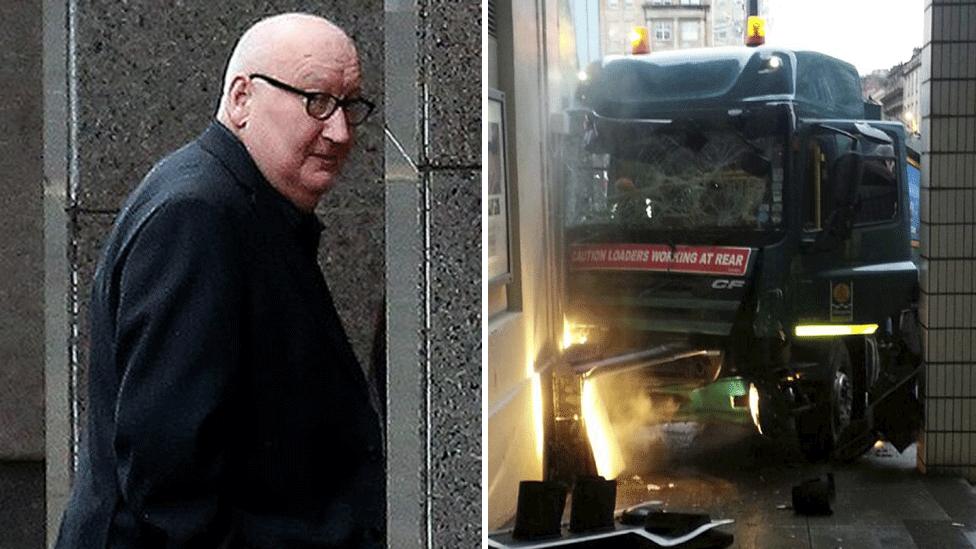
- Published28 August 2015
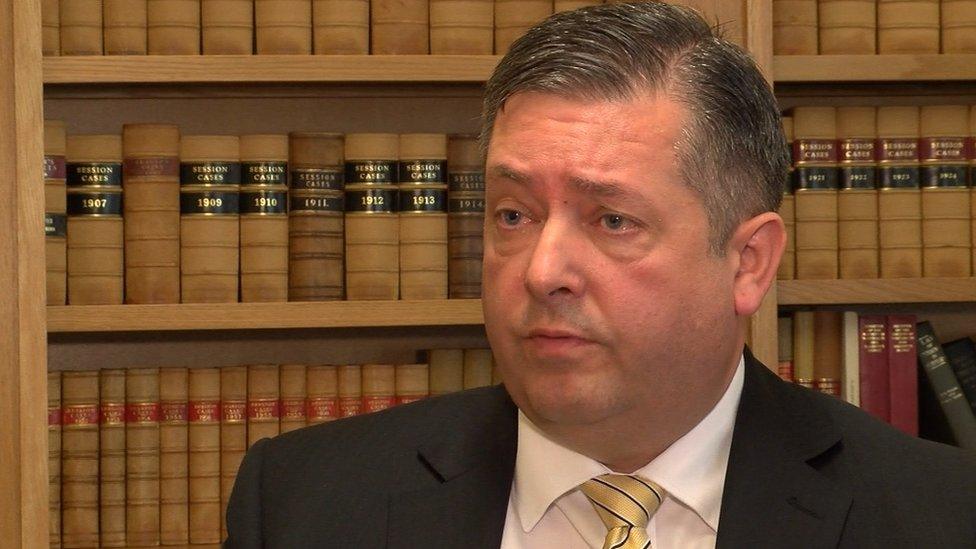
- Published21 August 2015
